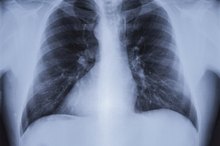Zyrtec & Cardiac Side Effects
Histamine is a substance produced by the body in response to allergic reactions that triggers immune response symptoms such as watery eyes, runny nose, and sneezing. Antihistamines are a class of drugs that block the action of histamine and reduce these symptoms. Older antihistamines had many side effects such as severe drowsiness. Newer antihistamines, called selective H1-receptor antagonists, do not cross into the brain and have fewer side effects. In 2007, the FDA approved Zyrtec, or cetirizine, as an over-the-counter drug to treat allergic rhinitis and chronic urticaria, a skin condition characterized by recurrent hives 2.
If you are experiencing serious medical symptoms, seek emergency treatment immediately.
Zyrtec Side Effects
RxList reports that the overall incidence of Zyrtec-related side effects requiring discontinuation of the drug is not different than placebo in large studies 2. The most common side effects, usually mild to moderate, are sleepiness, fatigue, pharyngitis, dry mouth and dizziness. Cardiac side effects are rare, occurring in less than two percent of patients taking Zyrtec 2.
Heart Failure
Albuterol Side Effects in Toddlers
Learn More
When the heart cannot pump enough blood to meet the body's demands, this is called heart failure. Heart failure has many causes, including heart attack, uncontrolled blood pressure, metabolic abnormalities and drug effects. Zyrtec has been linked to cases of heart failure through an unknown mechanism in a very small number of patients 2. Symptoms of heart failure include shortness of breath, cough and leg swelling and should be reported promptly to a health care provider.
- When the heart cannot pump enough blood to meet the body's demands, this is called heart failure.
- Zyrtec has been linked to cases of heart failure through an unknown mechanism in a very small number of patients 2.
Palpitations and Tachycardia
Palpitations are described as an unpleasant awareness of the heart beating or a fast heart rate, called tachycardia 3. Palpitations and tachycardia can occur with both normal and abnormal heart rhythms and have been reported in conjunction with the use of Zyrtec 23. Drugs.com reports these side effects are seen more frequently with Zyrtec-D, a combination of Zyrtec and pseudoephedrine 24. Pseudoephedrine is a decongestant and has been linked to numerous cardiac side effects.
Hypertension
Drugs Used in Nebulizers
Learn More
Hypertension occurs in less than two percent of patients taking Zyrtec and the mechanism of the blood pressure elevation in those patients is unknown 2. Zyrtec-D has a higher incidence of the hypertension side effect 2. This is thought to be related to the pseudoephedrine component of the drug. Zyrtec-induced hypertension resolves quickly with discontinuation of the drug 2.
Related Articles
References
- Drugs@FDA: Label and Approval History: Cetrizine Hydrochloride Allergy
- RxList: Zyrtec
- MedlinePlus: Heart Palpitations
- "Zyrtec Products." McNeil - PPC, Inc. 2009.
- De Sutter A, Saraswat A, van Driel M. Antihistamines for the common cold. Cochrane Database of Systematic Reviews. 2015. doi:10.1002/14651858.cd009345.pub2
- "Zyrtec Products." McNeil - PPC, Inc. 2009.
Resources
Writer Bio
Kathy Jutila has been writing health-related articles since 1979. Her work has appeared in "Infection and Immunity," "American Review of Respiratory Diseases," "Inflammation" and "Circulation." Jutila received a Bachelor of Science in biology, and a Master of Science in microbiology from Montana State University. She also holds a Doctorate of Medicine from the University of New Mexico.









